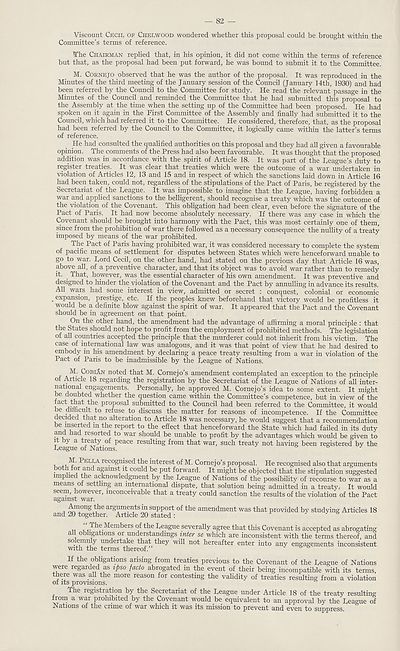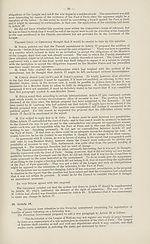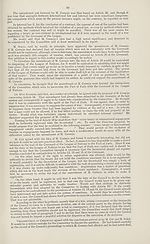Legal > Committee for the amendment of the Covenant of the League of Nations in order to bring it into harmony with the pact of Paris
(86)
Download files
Complete book:
Individual page:
Thumbnail gallery: Grid view | List view

— 82
Viscount Cecil, of Chelavood wondered whether this proposal could be brought within the
Committee’s terms of reference.
The Chairman replied that, in his opinion, it did not come within the terms of reference
but that, as the proposal had been put forward, he was bound to submit it to the Committee.
M. Cornejo observed that he was the author of the proposal. It was reproduced in the
Minutes of the third meeting of the January session of the Council (January 14th, 1930) and had
been referred by the Council to the Committee for study. He read the relevant passage in the
Minutes of the Council and reminded the Committee that he had submitted this proposal to
the Assembly at the time when the setting up of the Committee had been proposed. He had
spoken on it again in the First Committee of the Assembly and finally had submitted it to the
Council, which had referred it to the Committee. He considered, therefore, that, as the proposal
had been referred by the Council to the Committee, it logically came within the latter’s terms
of reference.
He had consulted the qualified authorities on this proposal and they had all given a favourable
opinion. The comments of the Press had also been favourable. It was thought that the proposed
addition was in accordance with the spirit of Article 18. It was part of the League's duty to
register treaties. It was clear that treaties which were the outcome of a war undertaken in
violation of Articles 12, 13 and 15 and in respect of which the sanctions laid down in Article 16
had been taken, could not, regardless of the stipulations of the Pact of Paris, be registered by the
Secretariat of the League. It was impossible to imagine that the League, having forbidden a
war and applied sanctions to the belligerent, should recognise a treaty which was the outcome of
the violation of the Covenant. This obligation had been clear, even before the signature of the
Pact of Paris. It had now become absolutely necessary. If there was any case in which the
Covenant should be brought into harmony with the Pact, this was most certainly one of them,
since from the prohibition of war there followed as a necessary consequence the nullity of a treaty
imposed by means of the war prohibited.
The Pact of Paris having prohibited war, it was considered necessary to complete the system
of pacific means of settlement for disputes between States which were henceforward unable to
go to war. Lord Cecil, on the other hand, had stated on the previous day that Article 16 was,
above all, of a preventive character, and that its object was to avoid war rather than to remedy
it. That, however, was the essential character of his own amendment. It was preventive and
designed to hinder the violation of the Covenant and the Pact by annulling in advance its results.
All wars had some interest in view, admitted or secret ; conquest, colonial or economic
. expansion, prestige, etc. If the peoples knew beforehand that victory would be profitless it
would be a definite blow against the spirit of war. It appeared that the Pact and the Covenant
should be in agreement on that point.
On the other hand, the amendment had the advantage of affirming a moral principle : that
the States should not hope to profit from the employment of prohibited methods. The legislation
of all countries accepted the principle that the murderer could not inherit from his victim. The
case of international law was analogous, and it was that point of view that he had desired to
embody in his amendment by declaring a peace treaty resulting from a war in violation of the
Pact of Paris to be inadmissible by the League of Nations.
M. Cobian noted that M. Cornejo’s amendment contemplated an exception to the principle
of Article 18 regarding the registration by the Secretariat of the League of Nations of all inter-
national engagements. Personally, he approved M. Cornejo’s idea to some extent. It might
be doubted whether the question came within the Committee’s competence, but in view of the
fact that the proposal submitted to the Council had been referred to the Committee, it would
be difficult to refuse to discuss the matter for reasons of incompetence. If the Committee
decided that no alteration to Article 18 was necessary, he would suggest that a recommendation
e^lrne^eC^ m ^1G rePor^ effect that henceforward the State which had failed in its duty
and had resorted to war should be unable to profit by the advantages which would be given to
i y a treaty of peace resulting from that war, such treaty not having been registered by the
League of Nations. & & j
u Pella recognised the interest of M. Cornejo’s proposal. He recognised also that arguments
poth tor and against it could be put forward. It might be objected that the stipulation suggested
imp le e acknowledgment by the League of Nations of the possibility of recourse to war as a
means of settling an international dispute, that solution being admitted in a treaty. It would
seem, however, inconceivable that a treaty could sanction the results of the violation of the Pact
against war.
, ar§^m^"ts iii suPPort of the amendment was that provided by studying Articles 18
and 20 together. Article 20 stated : J &
. u i 1 The.Members of the League severally agree that this Covenant is accepted as abrogating
all obligations or understandings inter se which are inconsistent with the terms thereof, and
so emn y undertake that they will not hereafter enter into any engagements inconsistent
with the terms thereof.
If the obligations arising from treaties previous to the Covenant of the League of Nations
were regarded as ipso facto abrogated in the event of their being incompatible with its terms,
there was all the more reason for contesting the validity of treaties resulting from a violation
or its provisions.
The registration by the Secretariat of the League under Article 18 of the treaty resulting
rom a war prohibited by the Covenant would be equivalent to an approval by the League of
Nations of the crime of war which it was its mission to prevent and even to suppress.
Viscount Cecil, of Chelavood wondered whether this proposal could be brought within the
Committee’s terms of reference.
The Chairman replied that, in his opinion, it did not come within the terms of reference
but that, as the proposal had been put forward, he was bound to submit it to the Committee.
M. Cornejo observed that he was the author of the proposal. It was reproduced in the
Minutes of the third meeting of the January session of the Council (January 14th, 1930) and had
been referred by the Council to the Committee for study. He read the relevant passage in the
Minutes of the Council and reminded the Committee that he had submitted this proposal to
the Assembly at the time when the setting up of the Committee had been proposed. He had
spoken on it again in the First Committee of the Assembly and finally had submitted it to the
Council, which had referred it to the Committee. He considered, therefore, that, as the proposal
had been referred by the Council to the Committee, it logically came within the latter’s terms
of reference.
He had consulted the qualified authorities on this proposal and they had all given a favourable
opinion. The comments of the Press had also been favourable. It was thought that the proposed
addition was in accordance with the spirit of Article 18. It was part of the League's duty to
register treaties. It was clear that treaties which were the outcome of a war undertaken in
violation of Articles 12, 13 and 15 and in respect of which the sanctions laid down in Article 16
had been taken, could not, regardless of the stipulations of the Pact of Paris, be registered by the
Secretariat of the League. It was impossible to imagine that the League, having forbidden a
war and applied sanctions to the belligerent, should recognise a treaty which was the outcome of
the violation of the Covenant. This obligation had been clear, even before the signature of the
Pact of Paris. It had now become absolutely necessary. If there was any case in which the
Covenant should be brought into harmony with the Pact, this was most certainly one of them,
since from the prohibition of war there followed as a necessary consequence the nullity of a treaty
imposed by means of the war prohibited.
The Pact of Paris having prohibited war, it was considered necessary to complete the system
of pacific means of settlement for disputes between States which were henceforward unable to
go to war. Lord Cecil, on the other hand, had stated on the previous day that Article 16 was,
above all, of a preventive character, and that its object was to avoid war rather than to remedy
it. That, however, was the essential character of his own amendment. It was preventive and
designed to hinder the violation of the Covenant and the Pact by annulling in advance its results.
All wars had some interest in view, admitted or secret ; conquest, colonial or economic
. expansion, prestige, etc. If the peoples knew beforehand that victory would be profitless it
would be a definite blow against the spirit of war. It appeared that the Pact and the Covenant
should be in agreement on that point.
On the other hand, the amendment had the advantage of affirming a moral principle : that
the States should not hope to profit from the employment of prohibited methods. The legislation
of all countries accepted the principle that the murderer could not inherit from his victim. The
case of international law was analogous, and it was that point of view that he had desired to
embody in his amendment by declaring a peace treaty resulting from a war in violation of the
Pact of Paris to be inadmissible by the League of Nations.
M. Cobian noted that M. Cornejo’s amendment contemplated an exception to the principle
of Article 18 regarding the registration by the Secretariat of the League of Nations of all inter-
national engagements. Personally, he approved M. Cornejo’s idea to some extent. It might
be doubted whether the question came within the Committee’s competence, but in view of the
fact that the proposal submitted to the Council had been referred to the Committee, it would
be difficult to refuse to discuss the matter for reasons of incompetence. If the Committee
decided that no alteration to Article 18 was necessary, he would suggest that a recommendation
e^lrne^eC^ m ^1G rePor^ effect that henceforward the State which had failed in its duty
and had resorted to war should be unable to profit by the advantages which would be given to
i y a treaty of peace resulting from that war, such treaty not having been registered by the
League of Nations. & & j
u Pella recognised the interest of M. Cornejo’s proposal. He recognised also that arguments
poth tor and against it could be put forward. It might be objected that the stipulation suggested
imp le e acknowledgment by the League of Nations of the possibility of recourse to war as a
means of settling an international dispute, that solution being admitted in a treaty. It would
seem, however, inconceivable that a treaty could sanction the results of the violation of the Pact
against war.
, ar§^m^"ts iii suPPort of the amendment was that provided by studying Articles 18
and 20 together. Article 20 stated : J &
. u i 1 The.Members of the League severally agree that this Covenant is accepted as abrogating
all obligations or understandings inter se which are inconsistent with the terms thereof, and
so emn y undertake that they will not hereafter enter into any engagements inconsistent
with the terms thereof.
If the obligations arising from treaties previous to the Covenant of the League of Nations
were regarded as ipso facto abrogated in the event of their being incompatible with its terms,
there was all the more reason for contesting the validity of treaties resulting from a violation
or its provisions.
The registration by the Secretariat of the League under Article 18 of the treaty resulting
rom a war prohibited by the Covenant would be equivalent to an approval by the League of
Nations of the crime of war which it was its mission to prevent and even to suppress.
Set display mode to:
![]() Universal Viewer |
Universal Viewer | ![]() Mirador |
Large image | Transcription
Mirador |
Large image | Transcription
Images and transcriptions on this page, including medium image downloads, may be used under the Creative Commons Attribution 4.0 International Licence unless otherwise stated. ![]()
| League of Nations > Legal > Committee for the amendment of the Covenant of the League of Nations in order to bring it into harmony with the pact of Paris > (86) |
|---|
| Permanent URL | https://digital.nls.uk/191509930 |
|---|
| Shelfmark | LN.V |
|---|
| Description | Over 1,200 documents from the non-political organs of the League of Nations that dealt with health, disarmament, economic and financial matters for the duration of the League (1919-1945). Also online are statistical bulletins, essential facts, and an overview of the League by the first Secretary General, Sir Eric Drummond. These items are part of the Official Publications collection at the National Library of Scotland. |
|---|---|
| Additional NLS resources: |
|

